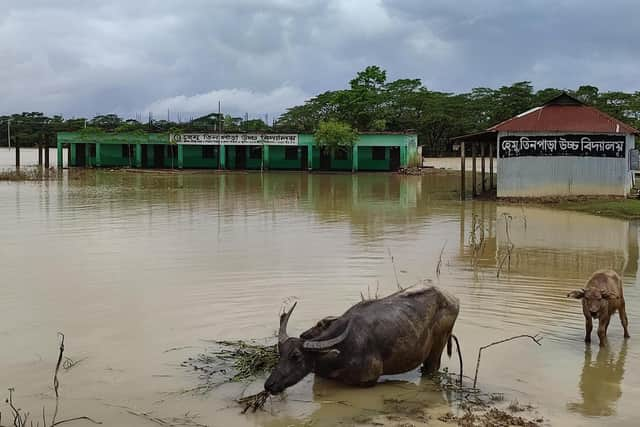The seal has been broken on the push for a Climate Fund to pay for Loss and Damage - Chris Hegarty
Many images stick in my mind. Activists from Brazil, Mali, Kenya and India gamely grinning (or at least trying) as we huddled in the driving November rain on a muddy hill in Kelvingrove Park for the start of a Climate Justice March. A carriage full of suited commuters mixing with representatives of indigenous communities from the Amazon on the 08:00 from Waverley to Queen Street. President Biden’s 25-vehicle motorcade swooshing through the service station at Harthill.
Whether the Glasgow COP was a success, a disaster or somewhere in-between was the subject of much debate. The one thing that everyone seemed to agree on, however, was the warmth of the welcome. A similarly warm welcome is much more likely to be matched by the weather at this year’s venue, Sharm El-Sheikh in Egypt, where COP27 is currently taking place.
Advertisement
Hide AdAdvertisement
Hide AdWith Glasgow being the 26th, and Sharm El-Sheikh the 27th, of these UN meetings, and with each successive one – notwithstanding any progress made – failing to deliver the steps set out so clearly as being necessary by the UN’s own scientific analysis, it’s fair to ask if these annual get-togethers are worth it.


On a global issue such as this, it surely makes sense for the world’s political leaders to gather to seek to find agreement and solutions. If COPs didn’t already exist, we would probably think that they should. But given the ever-closing window of opportunity for action, they simply must accelerate the rate, scale and urgency with which they find those agreements and solutions.
Within these talks a huge, ongoing sticking point is around an issue called Loss and Damage, which refers to the consequences of climate change which cannot be mitigated or adapted to. ‘Loss’ might, for example, reflect a lost way of life, cultural heritage, or economic losses such a ruined harvest or wrecked infrastructure. ‘Damage’ refers to something that could be repaired or recovered, such as ill-health, or damaged buildings.
To understand why this issue is so central, consider the issues of scale, and of justice. In terms of scale, the monetary amounts involved are huge. The economic costs of Loss and Damage in low-income countries alone have been projected to rise to $290bn - $580bn per year by the end of this decade. Yet, in terms of justice, those low-income countries’ contributions to causing climate change have been miniscule in relative terms. In other words, wealthier countries have historically done most to cause the crisis, but it is poorer countries that are facing the gravest consequences. Wealthy countries have a moral duty to make good that injustice.
Nushrat Chowdhury, Christian Aid’s Climate Justice Policy Adviser, based in Bangladesh, told me of this summer’s floods in her country, the worst in 20 years, as well as the vast floods in Pakistan just weeks later. She said: “Right now, if only there was a fund available for developing countries, Bangladesh and Pakistan governments could seek support from it to address the immediate needs for aid and shelter. In the medium and longer term, this support would help people to recover from these crises that are beyond their ability to cope; roads, bridges, and critical facilities such as schools and hospitals could be repaired and reconstructed in the flood-affected communities.”
So this is far from abstract: it is about vulnerable people and communities. And it is possible. Last year at COP26, the Scottish Government broke new ground by making Scotland the first wealthy country to pledge money for Loss and Damage. Since then, those funds have begun to be spent, supporting such communities in practical ways.
Following on from COP26, other countries, such as Denmark, have made similar commitments. The seal has been broken, and more governments – including the UK – now need to follow suit. Please join Christian Aid’s call at COP27 for the creation of an international climate fund, paid for by polluters, which will pay for the damage caused by the climate crisis to communities and the natural environment.
Consider adding your name to our petition at www.caid.org.uk/hacktheagenda.
Chris Hegarty, Senior Advisor, Policy, Advocacy & Communications, Christian Aid Scotland
Comments
Want to join the conversation? Please or to comment on this article.